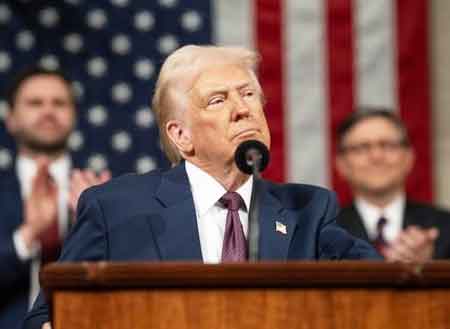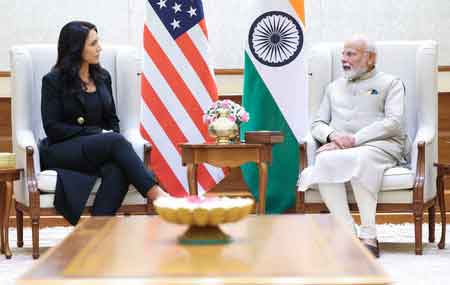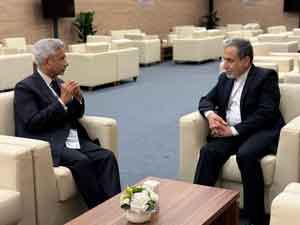India and the US have held the first strategic trade dialogue under the recently-launched cooperation in critical and emerging technologies such as semiconductors, space, AI and defense with the goal of "enabling co-production, co-development and enhanced industrial collaborations" in these sectors.
The meeting was held here on Tuesday. Foreign Secretary Vinay Kwatra led the India delegations and Undersecretary of State Victoria Nuland and Undersecretary of Commerce Alan Estevez co-led the US side.
The delegations met ahead of a highly-anticipated summit meeting of Prime Minister Narendra Modi and President Joe Biden here on June 22 which will include a state dinner and a joint address by the Indian leader to the US Congress, his second.
The India-US Strategic Trade Dialogue is being called a "key mechanism" to take forward cooperation under the India-US initiative on Cooperation in Emerging Technologies (iCET) launched earlier this year by Ajit Doval and Jake Sullivan, the National Security Advisers of the two countries. They were following up the announcement of this initiative by Modi and Biden in May 2022.
At the ICET meeting, the US side had given an assurance that it would fast-track the review and approval process of an application from General Electric to co-produce jet engines in India that could "power jet aircraft operated and produced indigenously by India".
The two sides could announce the project during the Prime Minister's visit, recent reports said, although neither party has officially given any indication.
India's Tejas light combat fighter jets currently use GE's F404 engines and the state-owned Hindustan Aeronautics Ltd (HAL) signs a $716 million contract with the American firm in 2021 for 99 of these engines, which are scheduled for delivery by 2029. HAL has said it planned to use Ge's 414 engines for its second generation of Tejas.
In the current deal, there is no transfer of technology for co production; just the finished engines are shipped to India to be mounted on the Tejas mainframe. Co-production will mean transfer of GE's jet engine technology to India.
These and other technology transfers are subjected to close scrutiny by the US under its export control regime. The two sides said these regimes were discussed and reviewed at the meeting on Tuesday. "Both sides reviewed the relevant bilateral export control regulations with the objective of building and diversifying resilient supply chains for these strategic technologies," the Indian Embassy said in a statement.
"They reviewed ongoing cooperation in multilateral export control regimes and agreed to share best practices. Both sides agreed to enhance awareness among the industry, academia and other stakeholders about the export control regimes through workshops and other activities."
Technology transfer has been a difficult discussion between the two sides. India has pressed American suppliers -- as other major arms manufacturing countries -- to include transfer of technology as a part of any deal to facilitate indigenisation for production for local use and export. American manufacturers have been reluctant arguing that, among other things, the Indian market is not large enough to merit transfer of proprietary technology.
"This thrust around tech-transfer within our high trust ecosystem demonstrates that our two governments can work effectively through complex areas of negotiation when they focus their energies and establish mechanisms like iCET to accelerate interagency coordination with full political backing from leaders," Atul Keshap, head of the US-India Business Council said in a statement.
"This serves as a clear model for our two systems to resolve legacy issues around market access and trade to enhance our shared prosperity.
"We're hopeful that progress under the iCET initiative will engender the political momentum for both governments to expand their ambitions on trade more broadly, which would reap significant benefits for workers and exporters in both our societies, helping both countries reach our shared $500 billion bilateral trade target. Ultimately, reaching this target would enhance the global competitiveness of both our countries, and demonstrate that the future of the global economy will be one anchored by democracy, free enterprise, and the rule of law."








Four held in Tripura for social media posts relating to Pahalgam terror attack
Police arrested four people including two retired teachers in the past 24 hours from Tripura’s three districts for making controversial posts on social media relating to the Pahalgam terror attack, officials said on Saturday.
Indian Army responds firmly to ceasefire violations by Pakistani troops along LoC
In the wake of the recent terrorist attack in Pahalgam, Pakistan has resorted to unprovoked ceasefire violations along the Line of Control (LoC). Over the past two days, Pakistani military posts have been targeting Indian positions with small-arms fire. The Indian Army has given a strong and appropriate response to these provocations, official sources said.
US religious freedom body finds conditions for Pakistan minorities 'worsening', urges strong action
Finding "a worsening religious and political climate of fear, intolerance, and violence" for minorities in Pakistan, the US Commission on International Religious Freedom (USCIRF) has asked President Donald Trump's administration to take strong measures against the Islamic Republic.
Residences of LeT commanders, Pahalgam attack suspects demolished across Kashmir
Security forces have intensified their crackdown on Lashkar-e-Taiba (LeT) operatives and suspects linked to the deadly Pahalgam terror attack that claimed 26 lives on April 22.
India, Pakistan will 'get it figured out,' says Trump on border tensions
US President Donald Trump refused to be drawn into India-Pakistan border tensions in the aftermath of the Pahalgam terrorist attack, stating that the two countries will "get it figured out one way or the other."
CM stresses scientific drain construction to combat flood
Chief Minister Prof. Dr. Manik Saha today emphasized the need to construct drains in a scientific manner to quickly drain the water accumulated in the city during heavy rains.
Bangladeshi man, drug smuggler held at Agartala Railway Station
In a significant development, two separate operations at Agartala Railway Station led to the arrest of a Bangladeshi national for illegal entry into India and a local individual involved in attempting to smuggle ganja to Assam.
Suspected Bangladeshi flag on Rickshaw, two detained
Tension flared in the Joynagar area of Agartala on Thursday late night after locals detained two individuals in connection with a rickshaw allegedly bearing the national flag of Bangladesh.